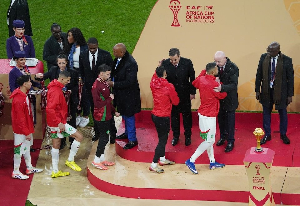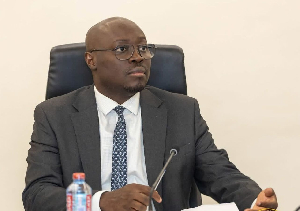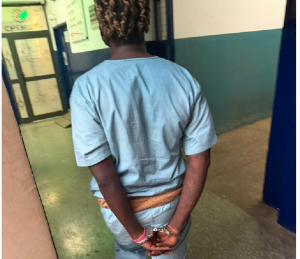The accurate recording of a nations history is of such importance that no effort should be spared to put things right. The depiction of persons as heroes in a nation must also go through similar pain staking processes in order that the essence of heroism is not lost on the people. In Ghana today, Kwame Nkrumah, Jones William Ofori-Atta, Joseph Danquah, Ako Adjei, Obetsebi Lamptey and Akuffo-Addo, are collectively known as the “Big Six”. The purpose of this write-up is to examine the sequence of events and individual acts of omission or commission of these men, and to determine their true place in the struggle for independence. Did the “Big Six” collectively represent the aspirations of the people in the struggle for independence? Are the “Big Six” National heroes?
My Webster dictionary defines a hero as “a man of distinguished bravery; one admired for his exploits”. It is against this definition that the actions of the six Gentlemen will be analyzed.
The popular story told to most people is that the six men namely Kwame Nkrumah, Jones William Ofori-Atta, Joseph Danquah, Ako Adjei, Obetsebi Lamptey and Akuffo-Addo were arrested following the 1948 strike action because of their fight against the colonial masters.
It is important at this point to look at the series of events that led to this strike action. The boycott of foreign goods and strike had been called by Nii Kwabena Bonne II (affectionately called Boycotthene), Osu Alata Mantse as a means of putting pressure on the Multinationals (Association of West African Merchants – AWAM) to reduce the price of their commodities. The day the strike was scheduled to end coincided with the march by the Ex-Service men who had been agitating for their legitimate “end of service” benefit for their service in the Second World War.
The Ex-service men had prior to this day been addressed by both Kwame Nkrumah and J. B. Danquah on 20th February 1948 at Palladium Cinema to show solidarity with their course. This demonstration however took a violent turn when some of the Ex-servicemen were gunned down under the order of Superintendent Colin Imray. This event is known to day as the Christiansborg Cross-Roads shooting. The men who fell were Sgt Adjetey, Cpl. Attipoe and Private Odartey-Lamptey. The anger of the Ex-servicemen and the general populace at the death of these men fueled the eventual violence that erupted leading to massive looting and destruction to public property. The looting, demonstration and destruction continued for five more days.
On March 1st 1948 the Riot Act was read and a state of emergency was declared. On 12th March 1948 a Removal Order was issued by Governor Creasy for the arrest of the six executives of the UGCC. Thus the creation, “The Big Six”. The six men were subsequently picked up as being responsible for the riots. From the moment of incarceration the other five members of the UGCC began to blame Nkrumah for their arrest. A commission was subsequently set-up by the colonial authorities to investigate the riots. The Commission of Enquiring was chaired by Mr. Aiken Watson. Other members were Dr. Keith Murray, Mr. Andrew Dalgleish and Mr. E. G. Hanrott. Part of the report reads;
“Mr. Nkrumah appears to be a mass orator among Africans of no mean attainments. Nevertheless he appears before us as a ‘Humble servant of the Convention’ who had subordinated his private political convictions to those publicly expressed by his employers. From the internal evidence before us we are unable to accept this modest assessment of his position. As appears in the Minute Book, the warmth of his welcome is reflected in the enthusiastic invitation from one member of the Working Committee to Mr. Nkrumah to ‘Use the organisation as his own’. From this it is clear that, for the time being at all events, he was occupying the role held by all party secretaries in totalitarian institutions, the real position of power.”
In another paragraph of the report, the commission states thus;
“In a working document circulated just before the disturbances we have been enquiring into, Mr. Nkrumah boldly proposes a programme which is all too familiar to those who have studied the technique of countries which have fallen the victim of communist enslavement. We cannot accept the naïve statement of the members of the working committee, that although this had been circulated, they did not read it. We are willing to believe that they did.”
Suffice to say the report of the Watson commission clearly showed that the other men blamed Kwame Nkrumah for the agitation and denied approval or knowledge of the organizational plan that Kwame Nkrumah as General Secretary had presented to the UGCC on 20th January 1948. This programme called for organized strikes, demonstrations and boycotts. The question then is, are these acts of denial, and blaming of Nkrumah by the other gentlemen worthy to be termed as distinguished acts of bravery or behaviours worthy of admiration?
On March 8th 1948 some teachers and students demonstrated against the detention of the “Big Six” and were immediately dismissed from their schools. Nkrumah upon release from prison proposed the setting up of a school for the dismissed teachers and students. The other members of the “Big Six” however disagreed with this idea and vehemently opposed Kwame Nkrumah on this matter. Kwame Nkrumah however disagreed and went ahead to set-up a school (Ghana National College) for the dismissed Students and Teachers. Worthy of mention is the fact that the seed money for the school was donated by Kwame Nkrumah from his monthly salary of twenty-five (25) pounds per month. Was this disapproval by the other members also another act of bravery or behaviour worthy of admiration?
My conclusion from the above actions of the individual members of the “Big Six” is that, the “Big Six” is a myth. Notwithstanding the fact that the six men were not directly responsible for the events of 28th February 1948, the betrayal of Nkrumah and the dismissed teachers and students by the other members of the UGCC when they needed each other most is unacceptable and an act not worthy of “National Heroes”.
It is therefore disingenuous to continued to immortalize the other five as representing the aspirations of the people of the Gold Coast towards independence. This attempt is not only a slap in the face of historical evidence but a fraud being perpetuated on the children of this country. If history must be told it must be told right. The true Heroes of 28th February are the Ex-servicemen, Nii Kwabena Bonne II and the ordinary men and women who took it upon themselves to respond to Nii Kwabena Bonne’s call for a boycott of goods sold by the Association of West African Merchants (AWAM), last but not the least are the Teachers and Students who demonstrated against the arrest of the six gentlemen.
Holding on to the myth of the “Big Six”, is clearly an exercise in futility. It amounts to nothing but the actions of a drowning man clutching to a straw. Let us tell the stories of our struggle for independence truthfully, that posterity will judge us fairly.
Our search for heroes during this 50th anniversary of our independence must lead us to find the names of the Students and Teachers who demonstrated against the arrest and detention of the six gentlemen. Worthy of mention is the fact that the first Teachers of Ghana National College volunteered to teach without salaries during those trying moments because Kwame Nkrumah could not afford it. These Students and Teachers deserve better than the other members of the UGCC. These are the ordinary men and women whose actions must continue to inspire us in the years ahead.















